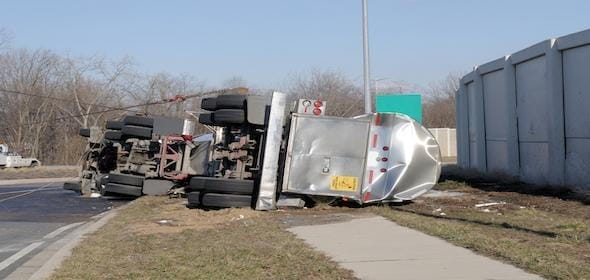FMCSA statistics show that cargo shifts are one of the leading causes of big heavy truck accidents. The shifting or falling cargo can lead to devastating injuries, damage to the truck, loss of cargo, damage to other vehicles on the road, or even fatalities. These disastrous crashes can be avoided if the loaders responsible for securing the load on the truck do their job.
Under the federal motor carrier safety regulations, section 393.100, the truck driver is responsible when transporting cargo, for all trucks, tractors, tractor-trailers, combination vehicles, full trailers, and pole trailers must be loaded and equipped to prevent it from shifting or falling.
The federal motor carrier safety regulations also require various securement systems and devices to meet particular standards for strength. For example, according to the FMCSR, the tiedown assemblies must have the total static breaking strength used to secure the cargo against movement in any direction with at least 1/2 times the weight of the cargo being secured. Trucking regulation state, “for load binders and hardware, the strength and hardware must be equal to or greater than the minimum specified for the tiedown assemblies.” (“Motor Carrier Resources – Trucking Expert”) The anchorages or other winches when connected to the cargo load on the truck must also have strength equal or greater than the strength of the tiedown assembly.
The truck driver is responsible for maintaining all the devices properly and securely tightening them, even during transit. If you are injured by a load shift truck accident or cargo freight shift car accident, you should contact our experienced cargo and load shift attorneys to make your trucking accident compensation claim in Michigan.
Why does truck cargo shift or fall?
Large commercial trucks like 18-wheelers have a very high center of gravity. Cargo can be heavier than the truck so this can make the truck jackknife or roll over if the cargo shifts. Shifting and falling cargo from a truck is preventable by taking the proper securement precautions.
The following are known to cause truck cargo to shift or fall:
- Improper securement of cargo or load will allow the articles to move around. The movement of the cargo can also cause the truck to roll over.
- Truck movement, maneuvers, stop and go action, create enough force for the movement to be transferred to the cargo then the cargo can shift.
- Incorrect balancing of cargo
If the cargo is improperly loaded into the trailer such as, improperly balanced, and/or improperly tied down and secured, the freight can shift and cause the whole truck to tip over.
How to Avoid Load Shift Accidents
Generally, the truck driver has the responsibility to observe and ensure the loading of the cargo on or in the trailer, unless the container is sealed and loaded outside of the driver’s presence. During transportation the truck driver should pay attention to any noises or sensations that would indicate the cargo has shifted. The truck driver should also check the cargo and the securement at each stop during transit.
Who is Liable for Damages Caused by Improper Loading of Cargo?
U.S. Department of Transportation and its administrative agency, the Federal Motor Carrier Safety Administration use the FMCSA safety regulations to regulate the trucking industry. The federal motor carrier safety regulations require the trucking company and the truck drivers to be responsible for the safe operation of the truck and trailer. The federal motor carrier safety regulations do not apply to shippers, consignors, or consignees who may load the container or trailer.
Trucking companies have a duty to make sure the freight they carry is secure. Unless prohibited, the truck driver should inspect and control the truck’s loading process before taking the load away.
If cargo being loaded is observed and the truck driver controls the loading and securing process, then the truck driver and the trucking company are responsible for shifting or falling load damages.
However, sometimes. the truck driver may not see or participate in the loading process such as when the cargo is sealed inside the container. In other words. the container door is sealed shut. The bill of lading would indicate the Shipper Loaded and Counted the cargo In these situations, and in this situation the shipper that loaded the cargo is fully responsible for the proper loading and securement of the load in the trailer. The shipper would be legally liable for damage, losses, and any injuries, if the cargo shifts or falls. If victims in other cars are injured by a load shift when loaded and secured by a shipper, the victim of the load shift accident would have a claim against the shipper.
If the shipper loaded, secured, and sealed the cargo in trailer, the trucking company generally is not liable for injuries caused by shifting or falling freight. This rule would apply if the trailer was loaded in a manner that makes inspection of its cargo impracticable. If a truck driver observes and/or takes part in the loading process and secures the freight for transportation, then the trucking company could be held liable for any shifting or falling freight damages.
Consult Truck Driver Shifting Cargo and Falling Load Lawyers In Michigan
If you or a loved one have been injured by a truck’s shifting cargo or falling load in Michigan, contact us today for a free consultation at 248-352-2110 or toll free at 1-866-447-3563 or complete our Contact Form.


